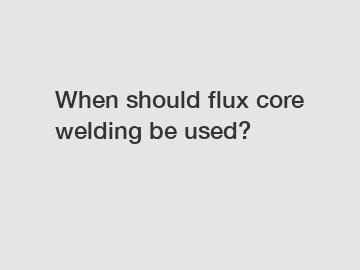Feb. 19, 2024
Mechanical Parts & Fabrication Services
Link to JINHUA HARDFACING
Flux core welding is a popular welding process that is commonly used in a variety of industries, from construction to manufacturing. Unlike traditional welding methods that use a shielding gas to protect the weld pool from atmospheric contamination, flux core welding uses a tubular wire filled with flux material. This flux material not only acts as a deoxidizer, but also as a shielding agent, creating a protective gas cloud that surrounds the weld pool and prevents contamination.
So when should flux core welding be used? There are several factors to consider when deciding whether or not flux core welding is the right choice for your project.

1. Outdoor Welding: One of the main advantages of flux core welding is that it can be used outdoors, where wind and other environmental factors can disrupt the effectiveness of traditional shielding gases. Because flux core welding relies on the flux material within the wire to create a protective gas cloud, it is less susceptible to environmental factors, making it an ideal choice for outdoor welding projects.
2. Thick Materials: Flux core welding is also well-suited for welding thick materials, as the flux material helps to create a deeper weld penetration. This makes flux core welding ideal for projects that require welding on materials that are 1/8 inch thick or thicker.
3. Fast Welding Speed: Flux core welding is known for its high welding speed, making it an efficient choice for projects that require a large amount of welding in a short amount of time. The higher deposition rates of flux core welding can help to increase productivity and reduce overall welding time.
4. Cost-Effective: Flux core welding can be a cost-effective alternative to other welding processes, especially in situations where outdoor welding or welding on thick materials is required. Because flux core welding does not require the use of an external shielding gas, it can be a more economical choice for certain projects.
5. Versatility: Flux core welding can be used in a variety of welding positions, making it a versatile choice for a wide range of projects. Whether you need to weld overhead, vertical, or horizontal, flux core welding can accommodate different welding positions with ease.
Despite its many advantages, there are also some limitations to consider when using flux core welding. For example, flux core welding produces more smoke and spatter than other welding processes, which can create a messier work environment. Additionally, flux core welding may not be suitable for projects that require a clean, aesthetically pleasing weld appearance.
In conclusion, flux core welding is a versatile and cost-effective welding process that is well-suited for outdoor welding, thick materials, fast welding speeds, and a variety of welding positions. By considering the specific requirements of your project, you can determine whether flux core welding is the right choice for you. Its many advantages make it a popular choice in industries where efficiency and productivity are key factors. So the next time you have a welding project that requires outdoor welding, thick materials, or fast welding speeds, consider using flux core welding for reliable and high-quality results.
For more information, please visit our website.
For more wear plate suppliersinformation, please contact us. We will provide professional answers.
Previous: Effortlessly Control Flow: Solenoid Operated Ball Valve Explained!
Next: Which 23 K series self-aligning ball bearings offer the best value for the purchase stage?
If you are interested in sending in a Guest Blogger Submission,welcome to write for us!
All Comments ( 0 )